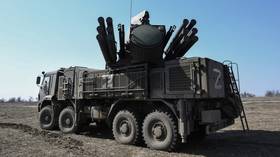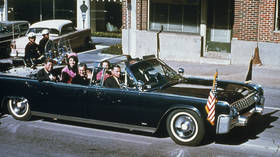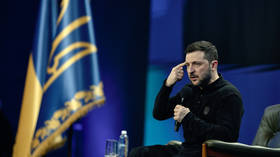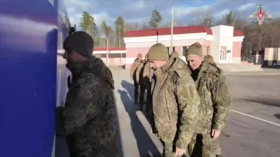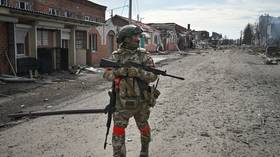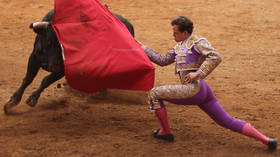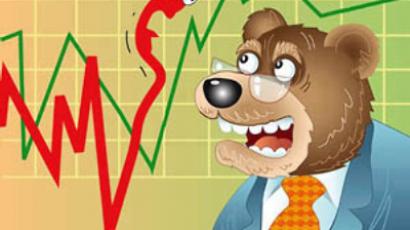ROAR: “Stalin replaced history with myths”

Some Russians will celebrate the 130th anniversary of Stalin’s birthday today, others are ready to protest against his legacy, but many are increasingly indifferent to him.
However, a majority of Russians surveyed by All-Russia Center for the Study of Public Opinion (VTsIOM) in December still like Stalin. Some 37% of 1600 respondents said they have a positive attitude to this person, including three percent who “admire him.”
At the same time, 35% of respondents said Stalin was “a cruel, inhuman tyrant who was responsible for killing of millions of innocent people.” The same number of people said that despite all his mistakes and vices “our people won the Great Patriotic War [in 1941-1945] under his leadership.”
About 28% of respondents are indifferent to him – the majority of them are among the youth.
Almost 30% of those polled said that Russia now needs “a leader like Stalin,” and 58% do not want such a head of state.
Mainly senior people have a positive attitude toward Stalin, Valery Fedorov, general director of VTsIOM, told Kommersant daily. Middle-aged respondents are divided almost equally. The first half of them believes that “he received the country with a wooden plough, and left it with a nuclear missile shield,” Fedorov said.
“Others are convinced that no merits could justify the GULAG [the repressive Soviet prison camp system],” he said.” And the young generation “is simply indifferent to Stalin,” he added.
“Nostalgia for Stalin in Russian society will remain until a genuine democracy and social equality emerges,” historian Nikolay Naumov from Moscow State University told Kommersant.
Then the society will not be divided between those who think that Stalin “is a bloody executioner” and those who consider him “an effective manager,” he believes. For all of them, Stalin will only be “one of the greatest actors on the historical stage,” he added.
In fact, “Stalin is already history for the present students,” Naumov said. But he added that if the gap between the rich and the poor increases, then “the longing for a tyrant and the iron fist” will grow stronger.”
Russian society is not united in its assessment of Stalin, Rossiyskaya Gazeta daily agrees. It quoted Ivan Melnikov, first deputy chairman of the Communist Party as saying: “When we speak about Stalin’s epoch, we should remember that the epoch is not only Stalin.”
The epoch is also “the state of the society and those challenges that the country was facing,” Melnikov said. “Anticipating the usual blame about repressions and the cult of personality, I want to stress that both of them were caused by many interconnected factors,” he added.
Melnikov believes that the country might have ceased to exist “if another man had been in the Stalin’s place. Weak and lacking strategic thinking.”
“It is at that time, in the period of the 1930s and 1950s, the configuration of the modern world had been forming, which has been settled by our times,” Melnikov said. He also added that “the fate of a man was dependent on what place the country would take in the world,” unlike today when “much is measured by the criteria of a consumer society.” Stalin was one of the Russian leaders who were “modernizers and revolutionaries,” Melnikov said.
Deputy of the State Duma from the Communist Party Viktor Ilyukhin also believes that Stalin was “a savior” of the country. “If he had not existed, we would not remember his repressions," he told Komsomolskaya Pravda daily. “And the German’s Buchenwald would be situated in our Urals and Siberia,” he added.
However, human rights activist Lyudmila Alekseeva told Rossiyskaya Gazeta that “Stalin’s terror simply devastated the country.” Nobody could escape the terror, she said, “not only those who actually criticized Stalin’s policy.”
“We lost about a million people,” Alekseeva said, adding that they “could not be forgotten by us.” The fact that the losses were caused “by the government against its own people is an unprecedented case in history,” she added.
“It is clear that blood-thirstiness, unscrupulousness and simply monstrous cruelty were his characteristic traits,” Alekseeva said. She described Stalin as “a villain, tyrant and a shifty fellow.”
“Why are praises to Stalin dangerous today?” she asked. “If we admire him and his deeds, the country might go through all this one more time, reduced in scale, but also terrible.”
Alekseeva said she does not believe that Russian society has sympathies for Stalin, adding that all these “artificial” sympathies “are cultivated by mass media” and are exaggerated.
She said that many myths should be forgotten, especially the one about Stalin as creator of the victory in the Great Patriotic War. “It is the people who won the war,” she said.
Russian President Dmitry Medvedev said in his videoblog in October that “millions of people died because of terror and false accusation” and that “there is no excuse for repressions.” He added that “Stalin's atrocities cannot detract from the feats of the people.”
Prime Minister Vladimir Putin also recently said that “millions of our citizens suffered from [repression]. All the positive things that Stalin accomplished were gained at an unacceptable price,” he added. At the same time, Putin stressed that the historical chain of events must be considered “in their entirety.”
Many human rights activists believe that “the de-Stalinization remains a vital necessity for Russia.” Yan Rachinsky, member of executive board of Memorial human rights group told Interfax news agency that “a legal assessment should be made” about Stalin and his crimes.
Andrey Svetenko, commentator for Vesti FM radio, noted that earlier, people were always either for or against Stalin, adding that “there were no indifferent people.” He also stressed the need to destroy myths about “the ruler of peoples.” The first myth is that “Stalin means order,” he said. But order based on fear “is an organized form of chaos rather than order,” he added.
“Stalin is a triumph of expediency, for the sake of which everything is sacrificed,” the commentator said. Stalin “created the administrative-command system,” he said, stressing that the quick industrialization and collectivization led to the disappearance of peasants.
The most terrible thing is that Stalin provoked mutual distrust among people, dividing people into “friends and enemies” and offering his own criteria for the both of them,” Svetenko said. Stalin left a terrible psychological legacy, “tearing traditions, initiating a constant rewriting of history and replacing it with myths,” he added.
Sergey Borisov, RT



